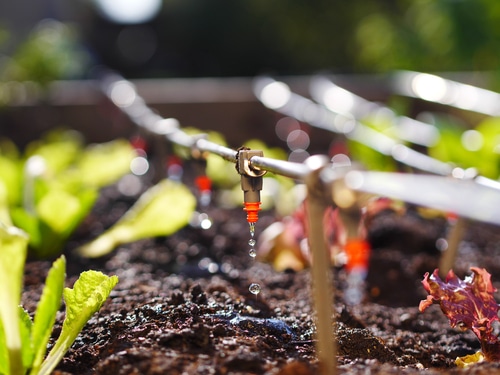On average, Tucson gets about 12 inches of rain per year, which is far less than the average for the U.S. It can be tough to keep your lawn lush and green, and to keep your garden healthy in the Southwest. That’s why many residents turn to Tucson drip irrigation systems. There are several types of irrigation systems that can work well for desert properties, but the drip irrigation system offers unique advantages.
Understanding How Tucson Drip Irrigation Works
The main difference between a drip irrigation system and other irrigation methods is the height of water distribution. A drip irrigation system distributes water at ground level. In contrast, other irrigation systems deliver water at a height. Because drip irrigation systems deliver water at ground level, they offer unique benefits for your garden.
Practicing Smart Water Conservation
Water conservation is important no matter where you live, but it’s particularly vital in the arid Southwestern U.S. A Tucson drip irrigation system is a smart choice because it minimizes water loss. Since the water is delivered at ground level, less water is lost through evaporation. In addition, the system of emitters allows water to soak into the ground. This prevents water loss through runoff.
As a result, a drip irrigation system can reduce water consumption by as much as 30% to 50% when compared to overhead watering methods. Furthermore, drip irrigation has a 90% efficiency rate in enabling plants to absorb the applied water.
Maintaining Ideal Growing Conditions
For homeowners in Tucson, drip irrigation systems offer another major benefit. They help you maintain ideal growing conditions for all of your plants. The water emitters provide small amounts of water distributed slowly and directed at the root zone. Because of this, it’s easy to keep the soil at ideal moisture levels. It allows the water to soak deep into the ground. This enables your plants to grow faster and better.
Discouraging Weed Growth
No one enjoys weeding their garden. It’s a major time investment, and furthermore, it can be tough on the knees and back. Another major benefit of Tucson drip irrigation systems is that they discourage the growth of weeds. Since the emitters distribute water directly to the base of your desired plants, the ground between the rows stays dry. This prevents weeds from flourishing in those areas.
Preventing Destructive Fungal Diseases
A fungal disease can spread quickly throughout your garden, spelling disaster for your plants. This is because water is an essential ingredient in allowing fungal spores to spread. Much like the seeds of plants, fungal spores require water for germination. Once they are germinated, they require a steady supply of moisture to live.
These “activated” spores can also travel in irrigation water, particularly overhead sprinklers as they splash droplets through the air. Watering your plants at ground level prevents water from splashing onto the stems and leaves. This is a critical safeguard against the spread of fungal diseases.
Saving You Time
Yet another reason why Tucson homeowners love drip irrigation systems is that they save time. Overhead sprinklers need to be periodically moved from one place to another, and they also need to be turned on and off at appropriate times. The use of an old-fashioned watering can or a garden hose is even more time-consuming.
However, once it’s installed, a drip irrigation system doesn’t need to be moved around. The landscaper can even place it on a programmable timer so you can take advantage of automatic watering.
When you’re ready to make the switch to a Tucson drip irrigation system, get in touch with the expert team at Action Yard & Tree Services. We’ve been a leader in irrigation systems in the Southern Arizona region since 2013. Among our residential and commercial clients, our landscapers have developed a reputation for conscientious work and friendly service. You can reach us at (520) 829-4791 to ask about our Tucson drip irrigation systems.


